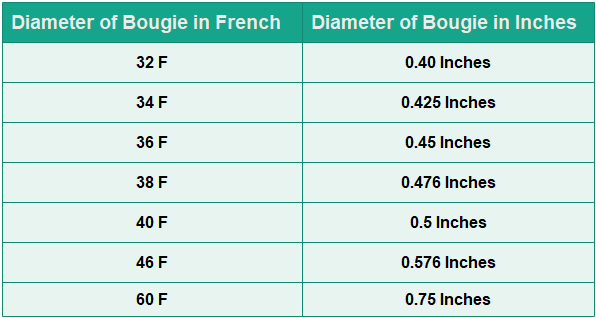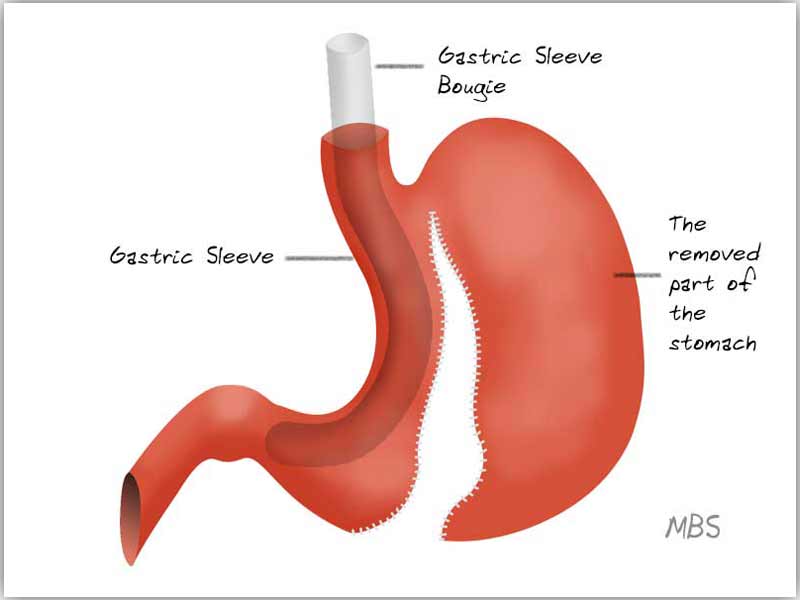Gastric Sleeve Bougie – The What, Why, When and How
Medically Reviewed by Katelyn J. Mock, US-Registered Dietician (R.D.)
Gastric sleeve or vertical sleeve gastrectomy (VSG) is a common weight loss surgery to combat obesity. It involves the removal of almost 75% of the stomach and creating a sleeve out of the remnant stomach using a device called a “bougie.” The bougie size is important as it plays an important role later on in determining your quality of life.
What is a Bariatric Surgery Bougie for Sleeve?
A measuring device was created in France to divide the stomach during gastric sleeve surgery. Bougie comes in different sizes and is measured in French, where 1 French (F) = one-third of a millimeter.
- The tube is placed into the mouth of the patient
- It is carefully pushed through the esophagus to the stomach.
- It ultimately rests at the pylorus.
What is the Ideal Size for a Bougie?

- The smaller the bougie, the smaller the stomach.
- A bigger bougie, the safer the surgery.
- With a bigger bougie, the weight loss isn’t ideal in most cases.
- The size is calculated on the basis of the BMI and the surgeon’s technique.
- A smaller gastric sleeve bougie would result in a smaller pouch.
- The smaller pouch risks an increase in gastric sleeve leaks and strictures.
- In the United States, bougie sizes range from 30F to 50F.
- The size of the gastric sleeve bougie varies from case to case.
- A smaller size bougie results in increased nausea and re-admissions.[1]Hawasli A, Jacquish B et al. “Early Effects of Bougie Size on Sleeve Gastrectomy Outcome”. American Journal of Surgery (2015) 209(3): 473-7. Web
View in Article
A study by Carlos Hoyuela proved that when the gastric sleeve is created using a 34 F bougie, it is highly safe and effective in reducing weight.[2]Hoyuela, Carlos. “Five-Year Outcomes of Laparoscopic Sleeve Gastrectomy as a Primary Procedure for Morbid Obesity: A Prospective Study.” World Journal of Gastrointestinal Surgery4 (2017): 109–117. PMC. Web.
View in Article
Why is a Bougie Used?

- The bougie creates a bulge in the stomach, guiding the surgeon on how to staple the stomach to form a stomach sleeve.
- The bougie does not guarantee an exact size of the stomach.
- Bougie is only a guide for the surgeon.
- The size of the new stomach depends on over-sewing the staple line.
- The stomach can normally hold 64 ounces of food.
- Gastric sleeve surgery reduces this number to approx. 15 ounces.
- The bougie is removed after the sleeve is performed.
References
- Hawasli A, Jacquish B et al. “Early Effects of Bougie Size on Sleeve Gastrectomy Outcome”. American Journal of Surgery (2015) 209(3): 473-7. Web
- Hoyuela, Carlos. “Five-Year Outcomes of Laparoscopic Sleeve Gastrectomy as a Primary Procedure for Morbid Obesity: A Prospective Study.” World Journal of Gastrointestinal Surgery4 (2017): 109–117. PMC. Web.
- “Gastric Sleeve Surgery: What’s Your Bougie Size?” Christine Stewart, Thursday, October 10th, 2013, National Bariatric Link
This Post Addresses
- Can you stretch a gastric sleeve?
- What is a bougie in bariatric surgery?
- Can you put weight back on after gastric sleeve?
- Can you drink soda after a gastric sleeve?
- Gastric Calibration Tube VSG

